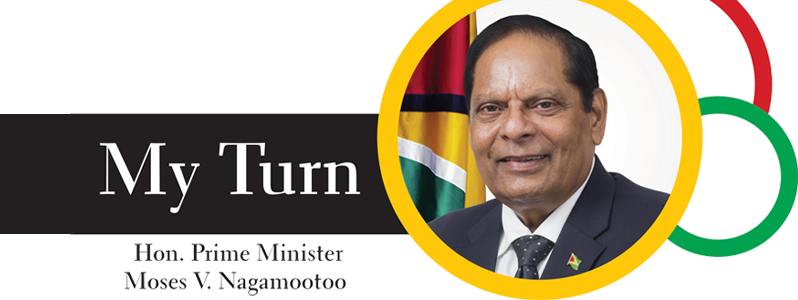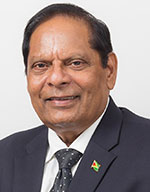AFTER meeting Opposition Leader Bharrat Jagdeo on March 6, President Granger two days later met with the Guyana Elections Commission (GECOM) for a brief on its state of readiness to hold regional and general elections within the shortest possible time.
On the day of the Government-Opposition talks, the second within a month, Guyana observed the 22nd death anniversary of Cheddi Jagan, the late President of Guyana.
LEGAL CONTROVERSIES
Though the December 21, 2018 no-confidence vote is still shrouded in legal controversies, the opposition is determined to take the perceived benefit from an event that is tattered with the messy cobwebs of suspected treachery. That benefit was to be new elections by March 21, which the opposition now reluctantly admits is “impracticable and impossible”. For many, not to have an election during Phagwah is itself a triumph of good over evil.
The opposition has since decided to kick the new elections can down the next corner on the road, that is; by April 30, knowing that the Elections Commission is not ready to hold any such elections within that tight time-frame.
So, at the meeting Wednesday last, the opposition leader insisted that President Granger should disrespect and discard the Elections Commission. He insisted that the President should unilaterally fix a date for elections, and GECOM would be required to toe the line.
CREDIBLE ELECTIONS
Jagdeo knows that the Constitution entrusts GECOM, not the President, with the power of holding elections, and that a key component of credible elections is a clean list of electors. The present list is padded with phantom names. At the same time, it excludes the names of youths who have now attained the age of 18, and could vote in any upcoming elections. His inexplicable obsession with disenfranchising young people makes his demand for early elections suspicious.
Jagdeo does not want a fresh cycle of house-to-house registration of voters. Instead, he insists that GECOM be forced to do a shortened process of revision of the existing voters’ list. He wants the President, as a function of his constitutional responsibility, to dictate to GECOM what form the preparation for elections should take, and within a time-frame imposed by the President.
He has conveniently refused to disclose the position he had assumed when, as President in 2006, he declared, in his own words:
“The law says that GECOM shall define the form of verification of the list, or may decide on verification and will decide on what form it will take. Not the PPP, not the PNC, not any party – GECOM. That’s a constitutional body, independent, just like the courts”.
OPPOSITION COMMISSIONERS
At the March 8 meeting with GECOM, a faction of the Commission who described themselves as “opposition commissioners”, repeated the Jagdeo mantra for premature elections, and even tried to submit a PPP work plan under which elections could be held by April 30. They insisted that GECOM has always held “credible” elections, unmindful that their party has challenged the “credible” results of the 2015 elections, the petition pending for hearing in court. They chose to forget that the opposition had initially boycotted sittings of the National Assembly in protest against alleged “rigged” elections.
It must be clearly understood that the constitutional responsibility over the conduct of elections rests with the Elections Commission. The President would announce a date for these elections AFTER he is advised by GECOM, and after Parliament has appropriated adequate funds under a work plan for the administrative conduct of the elections.
The usual format is that a date for elections is announced after the dissolution of parliament. It takes into account a time-frame for a qualifying date for electors, and for contesting parties to submit their list of candidates and their symbols, and for the printing of ballot papers.
These clearly are unattainable by an April 30 deadline. But the opposition would, if it has to, push the time-frame a month at a time to simulate a crisis. As I noted before, for the Jagdeo-led PPP, early new elections is a final sortie to grab State power for access to anticipated oil wealth.
RETURN TO DRAWING BOARD
President Granger has noted the difference of opinions on the seven-member bi-partisan GECOM, which comprises three representatives each from the Opposition and the Government, and the independent Chairman. The President has quite properly advised that GECOM should go back to the drawing board and come up with a consensual work plan or programme, within which credible elections could be held in the shortest possible time. In the meantime, the door for dialogue should remain open.
For Opposition Leader, Bharrat Jagdeo, who first received the presidency as a gift, the longer it takes to hold elections is a zero-sum gamble in which he sees only himself as winner, and everyone else a loser. The opposition would, therefore, leave no room for compromise. It would turn on the heat to drive the country into a political stalemate, which it would gleefully caricature as a “dictatorship”. It would invite foreign intervention, and court sanctions against Guyana.
This hard line will be the rallying cry at today’s ritual at Babu John when the name of Cheddi Jagan would be invoked in support of an unrighteous crusade. Those who have betrayed Jagan’s legacy would take centre-stage. But the Cheddi Jagan with whom I was associated until his death, and in whose party I served for 50 years, would never be complicit in the politics of deception. He would never encourage the rascality of vote buying, crossing the floor and other acts of political immorality of which he has been a victim. He would never celebrate the removal of a lawfully-elected government through complicity, trickery and betrayal and other foul means, and claim premature elections as a victory.
UNHOLY ALLIANCE
When Cheddi Jagan’s PPP won a plurality of votes at the 1964 elections, he felt, rightly, that he should have been invited to form the government. But the then opposition parties came together in what was seen as “an unholy alliance” and took the government from him. Cheddi lamented famously that his party was “cheated, not defeated”. Years later, Arthur Schlesinger, the aide to President John F. Kennedy, apologised, saying that “a grave injustice” was done to Cheddi Jagan.
Today, the nation should reflect on the fateful December 21, 2018 “unholy alliance” on the motion of no confidence in the lawfully-elected APNU+AFC Government, and the damage that has inflicted on the goal of national unity. It should also reflect on the legacy of incorruptibility of Cheddi Jagan, both as a guide and a warning against self-serving, zero-sum politics, at the expense of our nation’s well-being.












